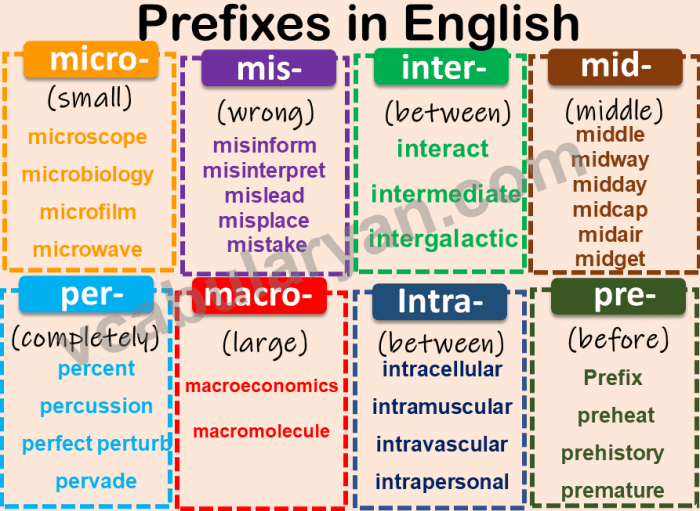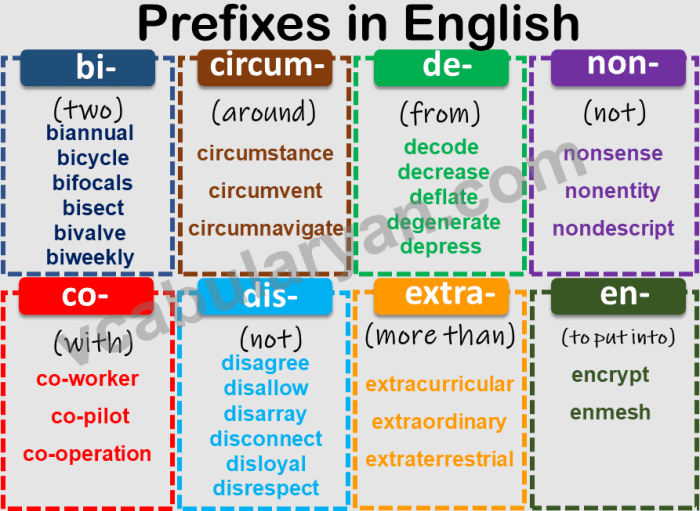Words with the prefix audi hold a captivating presence in the English language, inviting us to explore their origins, evolution, and significance. From their humble beginnings to their multifaceted roles in culture and cognition, these words weave a rich tapestry of meaning and linguistic intrigue.
As we delve into the historical evolution of words with the prefix audi, we uncover a fascinating journey that spans centuries and cultures. We trace their transformation from Latin roots to their adoption in English, witnessing how their meanings and usage have evolved over time.
Overview of Words with the Prefix “Audi”

The prefix “audi” is derived from the Latin word “audire”, meaning “to hear”. It is used in English to form words related to hearing, listening, and sound.
Here are some examples of words with the prefix “audi”:
- audience
- audible
- audio
- audit
- auditor
The prefix “audi” can be used in different ways in English. It can be used to form nouns, such as “audience” and “audio”, or adjectives, such as “audible”. It can also be used to form verbs, such as “audit”.
Historical Evolution of Words with the Prefix “Audi”

The prefix “audi” has a rich history, dating back to the Latin word “audio,” meaning “to hear.” Over time, words with this prefix have evolved in meaning and usage, reflecting the changing nature of communication and technology.
Significant Milestones, Words with the prefix audi
- 16th Century:The word “audience” emerged, referring to a group of listeners or spectators.
- 17th Century:“Audible” and “auditorium” entered the English language, expanding the vocabulary related to hearing and listening.
- 19th Century:The advent of sound recording technology led to the creation of terms like “audiophile” and “audiovisual.”
- 20th Century:The prefix “audi” became synonymous with sound and technology, as seen in words like “audiobook” and “audiovisual equipment.”
Evolution of Meaning and Usage
Initially, words with the prefix “audi” primarily focused on the act of hearing and listening. However, as technology advanced, their meaning expanded to encompass the recording, reproduction, and distribution of sound.
Today, words with the prefix “audi” play a crucial role in various fields, including music, broadcasting, education, and entertainment. They continue to evolve, reflecting the ever-changing landscape of communication and technology.
Diving into words with the prefix audi reveals their intriguing connection to the world of science. For instance, the term “audiophile” describes someone who takes great delight in listening to music, akin to the sophisticated experiments conducted in virtual fly labs.
Check out the virtual fly lab answer key to unravel the mysteries of insect behavior. Returning to the realm of words, “audience” encompasses the group of listeners or viewers, just as the prefix audi suggests, a keen attention to what’s being heard or perceived.
Cultural Significance of Words with the Prefix “Audi”
Words with the prefix “audi” hold significant cultural meaning across various societies. They reflect deep-rooted values, beliefs, and traditions, shaping cultural identity and providing insights into the collective consciousness of a people.
The Role of “Audi” in Cultural Identity
Words with the prefix “audi” often embody the essence of a culture. They convey a sense of belonging and shared history, connecting individuals to their ancestors and to the broader community. For example, the word “audience” in Western culture reflects the importance of public gatherings and the exchange of ideas.
In contrast, the word “audition” in performing arts highlights the significance of showcasing one’s talents and seeking recognition within a competitive environment.
Linguistic Analysis of Words with the Prefix “Audi”

Words with the prefix “Audi” exhibit distinct morphological, phonological, and semantic characteristics. Morphologically, they are typically compound words formed by combining “Audi” with another word or root. The prefix “Audi” serves as a bound morpheme, indicating a connection to hearing or sound.
Phonologically, words with the prefix “Audi” often feature a stressed first syllable, emphasizing the “Au” sound. This phonological pattern contributes to the distinctive pronunciation and recognition of these words.
Semantic Features
Semantically, words with the prefix “Audi” primarily relate to the sense of hearing or sound. They encompass a range of concepts, including:
- Devices or systems related to hearing (e.g., audio, audition)
- Perception and interpretation of sound (e.g., audible, auditory)
- Technical aspects of sound (e.g., audiophile, audiology)
Cognitive Processing of Words with the Prefix “Audi”

Understanding words with the prefix “Audi” involves a series of cognitive processes in the brain. These processes include recognizing the prefix, retrieving its meaning, and integrating it with the rest of the word to derive its overall meaning.
The prefix “Audi” is typically processed as a single unit, which facilitates its recognition and retrieval. The brain utilizes a distributed network of neural pathways to process both the prefix and the word stem, allowing for efficient and rapid comprehension.
Impact on Word Recognition and Retrieval
The presence of the prefix “Audi” can influence word recognition and retrieval. Studies have shown that words with prefixes are generally recognized and retrieved more quickly than words without prefixes. This is because the prefix provides a semantic cue that helps the brain anticipate the meaning of the word.
Additionally, the prefix “Audi” can help to distinguish between words that have similar meanings. For example, the words “audible” and “audible” have different meanings due to the presence of the prefix “in-” in the latter word.
Pedagogical Implications of Words with the Prefix “Audi”: Words With The Prefix Audi

Words with the prefix “Audi” provide valuable pedagogical opportunities to enhance language learning. They offer a systematic and accessible way to explore vocabulary, grammar, and cultural nuances.
By understanding the meaning and usage of “Audi” as a prefix, learners can expand their vocabulary and improve their comprehension of words with similar prefixes. For example, teaching the prefix “audi” along with words like “audience” and “audio” helps students recognize the common element of “hearing” or “listening” across these terms.
Practical Strategies for Teaching and Learning
Effective strategies for teaching and learning words with the prefix “Audi” include:
- Explicit Instruction:Introduce the prefix “Audi” explicitly, explaining its meaning and providing examples.
- Contextualized Examples:Use words with the prefix “Audi” in meaningful sentences or passages to demonstrate their usage.
- Interactive Activities:Engage learners in activities like word games, vocabulary puzzles, or discussions to reinforce understanding.
- Cognate Recognition:Help learners identify cognates (words with similar forms and meanings across languages) that share the prefix “Audi,” such as “audience” in English and “audiencia” in Spanish.
Creative Applications of Words with the Prefix “Audi”
Words with the prefix “audi” offer a rich tapestry of creative possibilities. Their inherent connection to hearing, listening, and the realm of sound opens up avenues for imaginative exploration in various artistic and literary domains.
In literature, authors can harness these words to craft vivid sensory experiences for readers. The evocative nature of words like “auditory” and “audible” can transport readers into a symphony of sounds, from the gentle rustling of leaves to the thunderous roar of a waterfall.
In Poetry
Poets, in particular, find inspiration in the sonic qualities of words with the prefix “audi.” By weaving these words into their verses, they create a rhythmic and melodic interplay that enhances the emotional impact of their poetry. For instance, the poet Emily Dickinson’s line “Hope is the thing with feathers” employs the word “audible” to evoke the elusive and ethereal nature of hope, making it almost tangible to the reader’s ear.
In Art
Visual artists can also draw upon words with the prefix “audi” to create multisensory experiences. Installations that incorporate sound elements, such as whispering sculptures or musical instruments made from everyday objects, invite viewers to engage with art on a deeper level.
By bridging the gap between sight and sound, these works challenge traditional artistic boundaries and create immersive environments.
General Inquiries
What is the origin of the prefix audi?
The prefix audi derives from the Latin word audire, meaning “to hear.” It is commonly used in English to denote words related to hearing or sound.
How are words with the prefix audi used in English?
Words with the prefix audi can be used in various ways in English, including as nouns (e.g., audience), verbs (e.g., audition), and adjectives (e.g., audible).
What is the cognitive significance of words with the prefix audi?
Words with the prefix audi activate specific neural pathways in the brain associated with auditory processing, enhancing our ability to recognize and understand sounds.